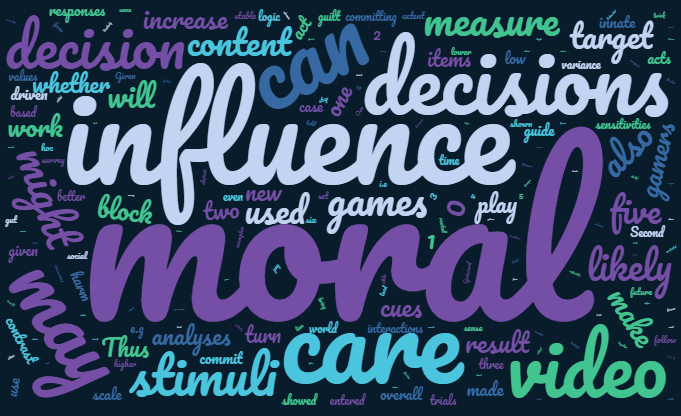The Effect of Moral Intuitions on Decisions in Video Game Play, written by Tamborini, Bowman, Prabhu, Hahn, Klebig, Grall, and Novotny, seeks to look at how gamers interact with games on a moral level. Specifically, they analyze whether priming an aspect of morality (ie: increasing the accessibility of an intuition), can impact choices in gameplay.
The evaluation of player morality is based on the MIME (Model of Intuitive Morality and Exemplars) which in turn is based off of MFT (Moral Foundations Theory). MFT holds that decisions are made at two tiers: intuitively and deliberately. Furthermore, moral judgement is seen as a gut level reaction more than a rational choice. While both are important, the intuitive system is used most often use when making decisions and the rational system is used for rationalization.
Defining Moral Intuitions
The MFT categorizes gut reactions into five “moral intuitions”: care, fairness, loyalty, authority, and purity (p. 567). Whether through genetics or childhood influences, each person has stronger and weaker intuitions in each category, and the MIME holds that the strength of these intuitions can be seen through players’ in game choices. A player who has values fairness will find this intuition more easily accessible and may experience a negative affect (emotional response) when making decisions regarding injustice in game or a positive affect in response to a decision or situation in which justice is served.
Accessibility of Intuitions
Media exposure can result in an intuition’s “temporary activation” or even “chronic activation” in cases of extended exposure (p. 568). Chronic accessibility refers to a baseline of morality that a player brings into the game. Thus, the relationship between player and game content is not one directional; chronic moral judgements affect how players react to the game at the same time that game content activates intuitions and makes them more accessible.

Study Methods
In this study, Tamborini et al. measured a baseline morality for 186 participants through the Moral Foundations Questionnaire. After a short game tutorial, the participants began playing quests that corresponded to each of the intuitions as well as one that was neutral. After each interaction, they completed an instrument that measured intuition accessibility.
Summary of Results
It was found that care and fairness rated as much more accessible than the other intuitions, both chronically and temporarily. These intuitions played out through player choice in game showing that players rely on their moral background when making decisions.
While chronic accessibility was a better measure of decision making, environmental aspects of game design may sway players from this path. For example, the fairness and purity scores on the test were not predictive of in-game choices. Players who didn’t score high on fairness still choose not to steal from children, and those who scored low on purity did not chose to swim in vile water. The author believes that this could be impacted by factors outside of morality such as the fear of in-game punishment for evil or being harmed by the swim. They also suggest player investment in the game may sway results.
In conclusion, while gamers make decisions in a strategic way, basing their choices off of the game environment and expectations, these choices are balanced by a moral code that they bring with them. The combination of factors is important to note when analyzing decisions or designing a game.
———-
Tamborini, R., Bowman, N. D., Prabhu, S., Hahn, L., Klebig, B., Grall, C., & Novotny, E. (2018). The effect of moral intuitions on decisions in video game play: The impact of chronic and temporary intuition accessibility. New Media & Society, 20(2), 564-580. doi.org/10.1177/1461444816664356
